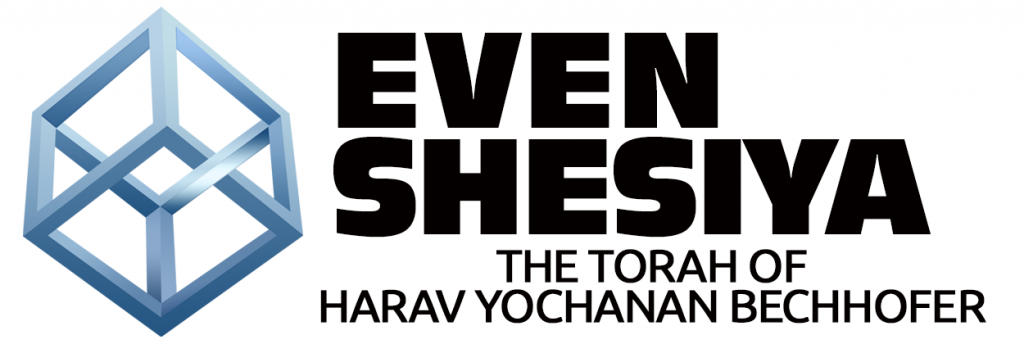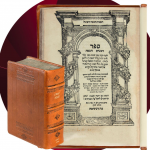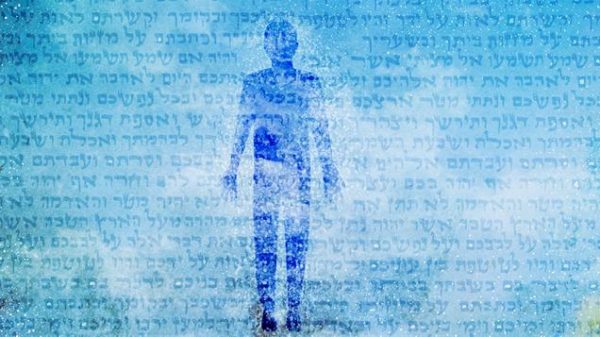Click here to download PDF
Didn’t we Talk about this?
In this week’s Parsha Moshe seemingly raises a concern that he raised already, and the answer is the same as it was. He raises the concern of being inarticulate, worried that Pharoh will not listen to him. He raises this twice in this week’s Parsha. First “….the Jewish people have not listen to me and how will Pharoh hear me and I have blocked lips”(6:12). He raises this concern again 18 Pesukim later “….indeed I have block lips at how will Pharoh listen to me”(6:30). The answer is: “….I have made you a master over Pharoh and Ahron your brother will be your spokesman”. Moshe had this discussion with Hashem already back in last week’s Parsha. Moshe voiced the exact same concern of being inarticulate and the final solution to the concern was to appoint Ahron as a spokesman. The pasuk there is nearly identical to the Pasuk in this week’s Parsha “….he will be for you a mouth and you will be to him a master”(4:16) What’s different about the concern and what’s different about the solution in this week’s Parsha?
Interrupting with Yichus and the subtle differences
There is something very peculiar about how Moshe raises the concern in this week’s Parsha. He first says “…. if the Jewish people did not listen to me certainly Pharoh won’t as I have blocked lips”(6:12). Hashem’s immediate response is “commanding Moshe and Ahron regarding the Jewish people to take the Jewish people out of Egypt”(6:13). Weren’t they commanded already to do that? What were they doing in last week’s Parsha? Following being commanded to take the Jewish people out of Egypt the Torah launches into the lineage of Moshe and Ahron. Why here? Why now? How does any of this answer Moshe’s concern? After this “New Command” to take the Jews out of Egypt and the lineage Moshe again raises the concern of having “block lips”. Seemingly rightfully so because he seemingly didn’t get an answer. However, the second time he’s only concerned about Pharoh, not the Jewish people! What changed? There are some subtle differences between Moshe’s concerns as expressed in last week’s Parsha and the way expressed it in this week’s Parsha. In last week’s Parsha he is concerned about being of “heavy mouth and heavy tongue”(4:10) and in this week’s Parsha he is concerned of “blocked lips”. In last week’s Parsha Moshe is appointed a master to Ahron and Ahron is his spokesman and this week Moshe becomes a master to Pharoh and Ahron is his spokesman. What is the meaning behind these differences?
Mouth & Tongue vs Lips
The mouth and tongue make the tones or “voice” whereas the lips cut down those tones into distinct words. Chazal refer to the activity of lips as “Chituch Sefasayim” – The cutting of the lips. They finalize the word by cutting it down to its final form. Once the word leaves the lips there’s no changing it, it’s final! The Zohar in this week’s Parsha (25b) discusses the difference between “lips” as opposed to “mouth and tongue”: mouth and tongue set the “Kol” -voice, but the finality of speech–“Dibur” is with the lips. The Zohar and commentaries correlate “Kol”-voice and “Dibur”-speech to the attributes of “Tiferes” and “Malchus”. “Tiferes” is the central guidance system. It charts the course and direction negotiating between “Chesed”- kindness and “Gevurah” – might/judgement. The Mishna says in Avos (2:1) “which is the “straight path” (i.e. direction) a man should choose that which is “Tiferes” for him and “Tiferes” in the eyes of mankind”. The Rambam explains that “Tiferes” refers to the “middle path” which is the balanced life which is the overall direction of Halacha. Even though the “path” is a balanced one, however, sometimes specific situations may demand unmitigated kindness or unmitigated toughness. The “tone” may leave latitude, but then comes the final “word” – the final directive for a definite outcome. The final word is “Malchus” -Kingdom as the pasuk says “…the word of King rules…”(koheles 8:4). The danger of having “tone” without “concrete words” is that a general direction could be ignored or never come to fruition! It’ll just be a “spirit”, a theoretical ideology. The difference is in the concrete details – that’s when it goes fully from idea to action!
Written Torah & Oral Torah – Prophet & King
The Zohar explains in several places that this is the relationship between the written Torah – “Tiferes” and the oral Torah – “Malchus”. A person learning the written Torah will get the “tone” of all the mitzvahs. However, there’s not one Mitzvah that you know how to do concretely without the oral Torah – That’s where the finalized nitty-gritty details (=words) are! The written Torah – “Tiferes” gives us our moral direction. What becomes written Torah? Prophecies! The prophets have given us direction, but the final Halachic decision or any final word that’s law is either the King or the Sanhedrin – That’s “Malchus” – as Chazal say: “The Rabbis are called kings!” (Gittin62a)
Voice of Hope
This is the process behind the transition of Moshe’s mission. In last week’s Parsha he is meant to “give hope” and announced the upcoming redemption to the Jewish people. They should look forward to that destiny. He was worried that they won’t believe him. Hashem assures them that they will and Torah attests to the fact: “….the nation believed and heard that Hashem remembered the children of Israel and saw their suffering..”(4:31). The Pesukim of Hashem assuring Moshe that the Jewish people will believe him use the recurrent phrase: “..they will listen to your “Kol” – voice”(3:18, 4:9) “they’ll listen to the “Kol”- voice of the Miracles…”(4:8). Moshe is coming as a Prophet to be the “Voice of Hope”. In Parshas Shemos main concern is of being of “Heavy mouth and Heavy Tongue” whether he’ll be successful in his mission to be the “Voice of Hope”. This was just the “direction” that things will take in the upcoming days, no concrete difference happened yet. Just the opposite! Things initially got worse for the Jewish people before they got better.
Actual Change
In this week’s Parsha everything comes to actual change! There are clear objectives that Moshe is to impart to Jewish people of how they’re going to leave Mitzrayim and how they are going to go to the land of Israel. Now Begins the actual change that’s in the details – in the words that are finalized by the lips. Actual changes begin to occur with the makos and this actual change brings to fruition the revelation of “I am Hashem in the midst of the Earth”(8:18). When things are just in a general direction like a prophecy for the future there’s no actual change in the present and the prophecy could be ignored. Parshas Vaeirah is to actually demonstrate those nitty-gritty down-to-earth details that I should it is known that “I am Hashem in the midst of the Earth”(8:18) At this time the Jewish people are NOT to relate to his words as a prophecy for the future and the direction things will take – but rather like the words of the king: every word is law and is to be executed immediately. Moshe’s “new concern” was: “Do I have that power of speech like that of a king that every detailed word has immediate concrete results”. He had this concern regarding governing the Jewish people, having that type of influence over them, and also whether Pharoh will relate to him as a leader to be reckoned with!
Moshe’s Coronation
Hashem’s responds by commanding Moshe “regarding the Jewish people to take them out of Mitzrayim” Rashi explains he commanded him “to govern them with patience and suffer them” – meaning – Hashem with that directive is coronating Moshe as King and Ahron as his second-in-command! Moshe is now King of the Jews -he’s not just a prophet, he is a prophet – King. He’s not just providing direction and hope – his word is law and whatever comes out of his mouth will have a concrete affect either on the Jewish people or on the cosmos. The Brisker Rov explains that that’s why immediately following this command we go into Moshe’s lineage. The halacha is that one can only become King or join the Sanhedrin if he has proper Jewish lineage. This is actually derived from Moshe as a text book example! As a function of his being coronated we have to go into his lineage.
Master over Pharoh & the Cosmos
Once Moshe is made King of the Jews he no longer is concerned about the Jews not listening to him! But he’s only King of the Jews, will Pharoh relate to him as a king? Moshe is not coming to issue a threats – Moshe is coming to give concrete orders to release the Jewish people. Moshe is to show that he is in full control as he challenges Pharoh to say when the Makos should cease and Moshe shows that he is in full control. He has to show Pharoh that his word is law of the cosmos! That’s what Hashem says further “I have made you a master over Pharoh and Ahron will be your spokesman” Last week Moshe was only Aaron’s Master – he is not the king, he is the prophet and Ahron is the prophet’s spokesman. Now he’s King and has final word in leading and influencing the Jewish people and as far as changing the cosmos by his command! He is representing the kingdom of Hashem and initiates the transition that makes the Kingdom of Heaven not a theory but puts the Kingdom of Heaven on Earth literally.











